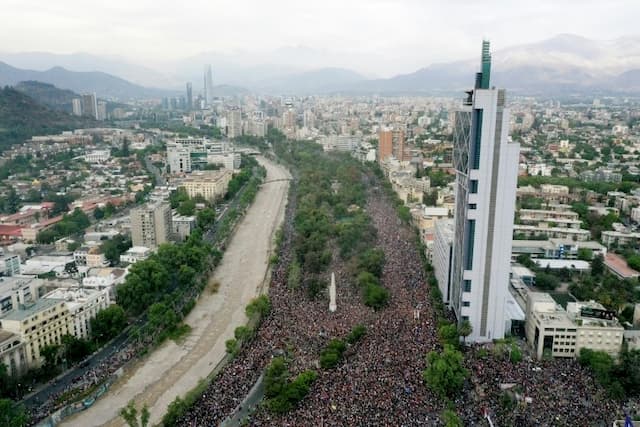Chile: More than a Million Protesters Put Pressure on the Government

More than a million people on the streets! The people of Chile demonstrate against social inequalities. A mobilisation never seen in this country.
The government of Chile and President Sebastian Pinera was on Friday 25th October 2019 more than ever under pressure: more than one million people marched in Chile in a historic mobilization to protest against social inequalities.
A week after the beginning of a wave of protest unprecedented for decades in a country considered one of the most stable in Latin America, the mobilization did not give way.
The governor of the Santiago region, Karla Rubilar, expressed her “emotion” at the massive participation in this event which, according to her, gathered “more than one million people in Santiago and different regions of the country”.
Earlier, Santiago City Council said in a tweet that, according to the police, “more than 820,000 people” were gathered in the centre of the capital.
In his first reaction, conservative President Sebastian Pinera said he “heard the message” delivered by the protesters.
“The merry and peaceful crowd is marching today, with Chileans demanding a more just and supportive Chile, it opens great paths of future and hope. We have all heard the message”
The protesters, waving Chilean flags and singing songs popularized during the Augusto Pinochet dictatorship (1973-1990), gathered in Plaza Italia, which became the epicentre of the protest movement, as well as in several avenues. adjacent.
“It will probably be the biggest gathering of all time,” enthused Francisco Anguitar, 38, a development agent in artificial intelligence, in the procession of Santiago.
“We demand justice, honesty, ethics in government. We do not want socialism, communism, we want fewer private companies, no more state”
The first effect of this mobilization, “is that we will never have to suffer any more abuse, ever again. People are ready to make the sacrifice, if we have to stop everything for a week, a month, we will do it, no matter what it costs us, “said Carlos Lazo, a 77-year-old retiree.
Several cities in a state of emergency
Tens of thousands of people also demonstrated in several other major cities in Chile.
While a large part of the country and the capital remained under a state of emergency, with 20,000 police and military personnel deployed, the demonstration in the capital took place in a festive atmosphere.
An atmosphere that contrasted with the violent riots that erupted a week ago, with looting and looting of dozens of subway stations, gas stations and supermarkets.
Read also: Chile: 7 dead in riots, president declares country “at war”
Sporadic incidents took place at the end of the demonstration, before the application of a seventh curfew for the 7.5 million inhabitants of Santiago.
In front of the presidential palace of La Moneda, the police resorted briefly to water lances, tear gas and launchers of ball of defense to disperse some demonstrators, found the AFP.
“A second transition”
The announcement Tuesday by Mr Pinera of a series of social measures, including an increase in minimum old age, a rise in taxes of the richest, and a freeze of the increase of 9.2% of electricity, has not had the desired effect.
More determined than ever, the protesters did not release the pressure on the Chilean power.
In the morning, hundreds of motorists and truck drivers had participated in snail operations on motorways that connect Santiago to the rest of the country to protest against toll prices, causing major traffic jams.
“We, the small carriers, are overwhelmed by the prices of motorways (…) we join the mobilization,” said Marcelo Aguirre, a 49-year-old driver.
The question of the price of transport had already been the detonator of this unprecedented social movement when the students had called to protest against an increase of more than 3% of the price of the metro ticket in the capital.
Despite the suspension of the measure, social anger has not subsided. The movement, heterogeneous and without identifiable leaders, has grown, fueled by resentment at the socio-economic situation and inequalities in this country of 18 million inhabitants.
Friday’s huge mobilization “constitutes a point of inflexion after thirty years marked by increasing de-politicization since 1989”, as the democratic transition ending the Augusto Pinochet regime began, said Marcelo Mella, a political scientist at the University of Santiago.
The movement “calls on political leaders to push for profound changes in the capitalist development model. A kind of the second transition, “he added.
Enjoyed this? Get the week’s top France stories
One email every Sunday. Unsubscribe anytime.


